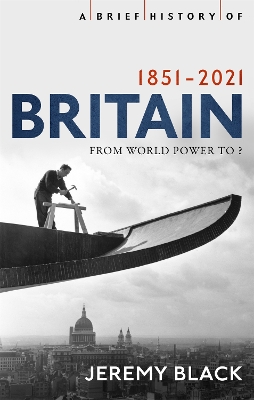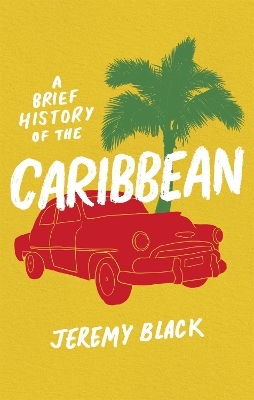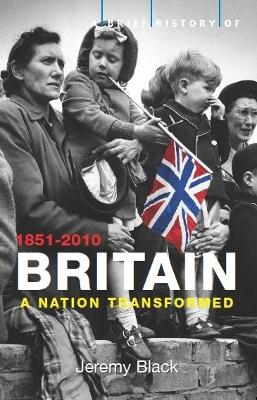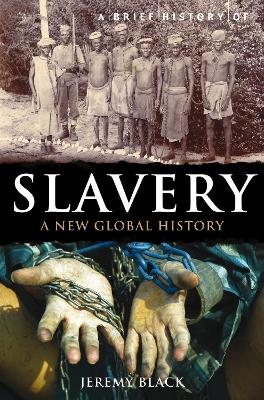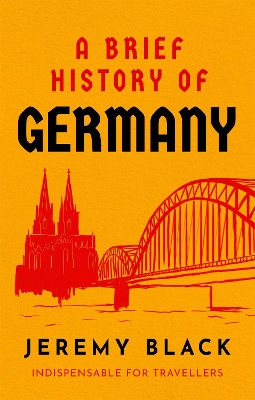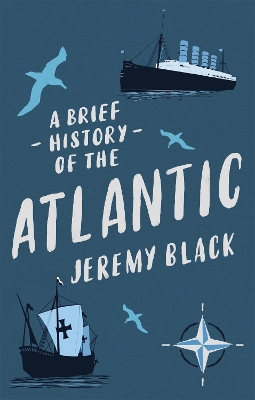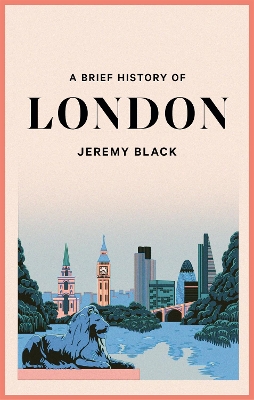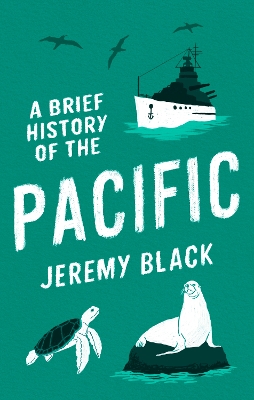Brief Histories
8 total works
From the Great Exhibition's showcasing of British national achievement in 1851 to the opening ceremonies of the Olympics in Stratford in 2012 and on to Brexit, an insightful exploration of the transformation of modern Britain
This revised and updated fourth and final volume in the concise Brief History of Britain series begins in the specially-constructed Crystal Palace, three times the length of St Paul's Cathedral, in Hyde Park at the beginning of the second half of the nineteenth century. The Great Exhibition it housed marked a high point of British national achievement, at the forefront of the Industrial Revolution, at the heart of a great empire, with Queen Victoria still to reign for fifty years. It was a time of confidence in the future, and exuberant patriotism for Britain's role in it.
The beginning of the Second World War in 1939 marks a turning point because of the great change it heralded in Britain's global standing. At its peak, protected by the world's greatest navy, the British Empire stretched from Australasia to Canada, from Hong Kong and India to South Africa, and from Jamaica to the Falklands. Now the empire is no more: a fundamental change not only for the world, but also for Britain. The Second World War had been won, but it had exhausted Britain and marked the beginning of its national decline.
Black links cultural and political developments closely - transport, health, migration and economic and demographic factors - in order to make clear how porous and changeable the manifestations of national civilisation can be, and to make sense of themes such as the triumph of town over country, Britain's international clout and the shift from the dominance of the market at the turn of the nineteenth century to the growing significance of the state.
Importantly, he also looks at how public history has presented the nation's past, and how the changing and different ways we look at that past are central aspects of our shared history.
A concise history of the Caribbean's long and fascinating history, from pre-contact civilisations to the present day
This is a concise history, intended for travellers, but of inestimable value to anyone looking for an overview of the Caribbean and its mainland coastal states, with a focus on the past few centuries.
The history of the Caribbean does not make much sense without factoring in the cities - Pensacola, New Orleans, Galveston - and the ambitions of the states on its continental shores, notably the United States.
This account is grounded in a look at the currents and channels of the sea, and its constraints, such as the Mosquito Coast, followed by the history of 'pre-contact' civilisations, focusing on the Maya and the Toltec Empire.
With the arrival of the Europeans, from the late fifteenth century to the early years of the seventeenth century, the story becomes one of exploration, conquest and settlement. Black charts the rise of slave economies and the Caribbean's place in the Atlantic world, also the arrival of the English - Hawkins and Drake - to challenge the Spanish.
He examines the sugar and coffee slave economies of the English, French, Spanish and Dutch, also the successful rebellion in Haiti in the eighteenth century, and how the West Indies were further transformed by the Louisiana Purchase, the American conquest of Florida and the incorporation of Texas.
He discusses the impact of Bolivar's rebellion in Spanish America, the end of slavery in the British Caribbean, and war between Mexico and America; also the defeat of the South by the Union, the American takeover of the Panama Canal project from France, and the Spanish-American War.
The first half of the twentieth century focuses on growing US power: intervention in Mexico, Honduras, Nicaragua, Panama, Haiti and the Dominican Republic; Cuba as an American protectorate, and civil wars in Mexico.
The Cold War brought new tensions and conflict to the region, but the same period also saw the rise of the leisure industry. The last part of the book looks at the Caribbean today - political instability in Venezuela and Colombia, crime in Mexico, post-Castro Cuba - and the region's future prospects.
This fourth and final volume in the wonderfully concise Brief HIstory of Britain series begins with Queen Victoria opening the Great Exhibition in Hyde Park. This was high-water mark of British achievement - the nation at the forefront of the Industrial Revolution, at the heart of a burgeoning Empire, with a queen who would reign for another fifty years.
During the ensuing 150 years, Britain has faced turmoil and transformation. But it is too simple to talk of decline.
In the concluding volume of this landmark four-volume series, Jeremy Black explores issues such as whether Great Britain has sacrificed its identity in order to stay part of the present world order. This is an insightful examination of how present-day Britain was formed.
A thought-provoking and important book that raises essential issues crucial not only for understanding our past but also the present day.
In this panoramic history, Jeremy Black tells how slavery was first developed in the ancient world, and reaches all the way to the present in the form of contemporary crimes such as trafficking and bonded labour. He shows how slavery has taken many forms throughout history and across the world - from the uprising of Spartacus, the plantations of the West Indies, and the murderous forced labour of the gulags and concentration camps.
Slavery helped to consolidate transoceanic empires and helped mould new world societies such as America and Brazil. Black charts the long fight for abolition in the nineteenth century, looking at both the campaigners as well as the harrowing accounts of the enslaved themselves.
Slavery is still with us today, and coerced labour can be found closer to home than one might expect.
The history of Germany is intricately woven. Threaded in time through its struggles and triumphs with religion, industrialisation, enlightenment, politics, unification, and war.
In A Brief History of Germany, Jeremy Black questions how the Germany we know today came to be, chronicling the events that shaped its past, present and future in a fascinating new way.
From the fall of Rome in the 1500s to the enlightenment in the 1700s, from World War I and World War II to Germany post-unification, Black's writing will unlock the places and people that formed Germany and enrich your visit with stories of its society and culture.
Concise yet explorative, A Brief History of Germany is an astonishing work from a renowned UK historian. Whether you are a long-term reader of Black's expansive history work or are interested in learning more ahead of a short city break or longer trip, this intriguing look at the history of Germany is an essential read.
The Atlantic has borne witness to major historic events that have drastically shaped humanity with each crossing of its path. In this broad and readable book, Jeremy Black takes the reader through its evolution to becoming one of the most important oceans in the world.
Black discusses the importance of the Atlantic in relation to world history as well as addressing topics such as those bravest to attempt to cross the ocean before Columbus, the beginnings of slavery from 1400-1600, the struggle for control between empires in the 1600s, the way technology adapted with steamships to telegraph cables, the battle of the Falkland, and the Cold War.
Black also touches on the Atlantic we know today, and the struggles it faces due to urgent global issues including climate change, pollution, and the trials of the economic rise in the Indo-Pacific world.
If you have ever yearned to know more about this famed and vital ocean, this clear and concise history will be a key read as one of the first of its kind on its evolution to becoming an established world ocean.
As the United Kingdom left the European Union, during a period of international and domestic turmoil, London found itself at a turning point. This critical moment presents an opportunity to look back, with a distinctive perspective, a focus on London in its national and, perhaps even more importantly, its international contexts, rather than on the city itself in isolation.
It is the interactions of London that Black considers, and he does so in order to address the question as to why London became the foremost international city, how it sustained that position, and what its future holds.
The book is as much about economics and culture as it is about politics and society. It deals with migration, communications, empire and cultural energy, rather than the mechanisms of parish vestries. London's earlier period is covered, but the principal focus is on the last half millennium, the period during which London became a major trader with the trans-oceanic world, and the ruler of trans-oceanic colonies, while the English language became an increasingly important cultural medium, one centred on London.
The book includes plentiful literary references, quotations from visitors, and boxes covering discrete topics, such as Jack the Ripper.
This brilliantly concise history of the Pacific Ocean nevertheless succeeds in examining both the indigenous presence on ocean's islands and Western control or influence over the its islands and shores. There is a particular focus on the period from the 1530s to 1890 with its greater Western coastal and oceanic presence in the Pacific, beginning with the Spanish takeover of the coasts of modern Central America, Colombia, Ecuador and Peru, and continuing with the Spaniards in the Philippines.
There is also an emphasis on the very different physical and human environments of the four quadrants of the Pacific - the north-east, the north-west, the south-east and the south-west - and of the 'coastal' islands, that is the Aleutians, Japan and New Zealand, and continental coastlines. The focus is always on the interactions of Japan, California, Peru, Australia and other territories with the ocean, notably in terms of trade, migration and fishing.
Black looks first at the geology, currents, winds and physical make-up of the Pacific, then the region's indigenous inhabitants to 1520. He describes the Pacific before the arrival of Europeans, its history of settlement, navigation methods and religious practices.
From Easter Island, the focus shifts to European voyages, from Magellan to Cook and Tasman, the problems they faced, not least the sheer scale of the ocean. Black looks at the impact of these voyages on local people, including the Russians in the Aleutian Islands.
Outside control of the region grew from 1788 to 1898. The British laid claim to Australia and America to the Phillipines. Western economic and political impact manifested in sandalwood and gold rushes, and the coming of steamships accelerated this impact.
Territorial claims spread through Willis, Perry and the Americans, including to Hawaii. Black looks at the Maori wars in New Zealand and the War of the Pacific on the South American coast. Christian missionary activity increased, and Gaugin offered a different vision of the Pacific.
1899 to 1945 marked the struggle of empires: the rise of Japan as an oceanic power, and the Second World War in the Pacific as a critical moment in world history.
Oil-powered ships ushered in the American Age, from 1945 to 2015, bringing the end of the British Pacific. France had a continued role, in Tahiti and New Caledonia, but America had become the dominant presence. Black explores the political, economic and cultural impacts of, for example, Polynesians attending universities in America and Australasia; the spread of rugby; and relatively little international tension, although some domestic pressures remained, including instability in Papua New Guinea and Fiji.
The book ends with a look at the Pacific's future: pressures from industrial fishing, pollution and climate change; the rise of drug smuggling; greater Chinese influence leading to conflict with America and Australasia - the Pacific is once again on the frontline of military planning. But the Pacific's future also includes tourism, from Acapulco to Hawaii, and from Tahiti to Cairns.
